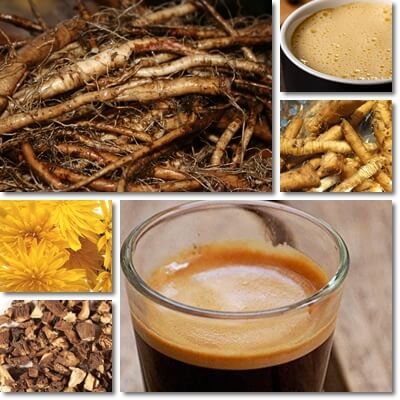Dandelion coffee is an alternative to coffee that is naturally caffeine free, but nonetheless a source of many benefits for health. Dandelion coffee is made from roasted and ground dandelion root and prepared the same way as actual coffee. It tastes like coffee, with rich warm notes and mildly bitter, but none of the acidity of real coffee. If you are looking for a healthy substitute for coffee, you may consider dandelion coffee if you aren’t allergic to plants in the Asteraceae family such as dandelions, chamomile, daisies or sunflowers.
What kind of coffee is dandelion coffee?
Despite the name, dandelion coffee is not real coffee. Officially, dandelion coffee is classified as a coffee substitute meaning an alternative to coffee meant to be consumed instead of the iconic brew. As a coffee substitute, and quite a successful one, dandelion coffee looks and tastes fairly similar to actual coffee. However, in the eyes of coffee lovers, it is nonetheless an inferior product with a different aroma altogether. But like actual coffee, dandelion coffee too is a source of benefits for health, and side effects.

Dandelion coffee vs coffee
What is the difference between actual coffee and dandelion coffee? Coffee itself is an infused or boiled drink made from the seeds of the coffee fruit called coffee berry or coffee cherry. The scientific name for the coffee plant is Coffea and there are over a hundred different species. Coffee seeds, commonly called ‘coffee beans’, are roasted and ground to a fine powder then brewed to make coffee.
Dandelion coffee on the other hand is an infused or boiled drink resembling coffee in taste and appearance, but made from a different plant altogether: the dandelion plant (scientific name: Taraxacum). Versus coffee which is made from fruit seeds, dandelion coffee is made from a different plant part too: dandelion root. At the moment, there are 30 to 60 species of dandelion, each with dozens to hundreds of microspecies. Any of them can be used to make dandelion coffee, provided the root is edible.

How is dandelion coffee made?
Dandelion coffee is made from processed dandelion root. The dandelion root is a taproot, that is, a central root that looks like a carrot – long, thick and tapering – with some lateral root sprouts. The root is cleaned, roasted and ground to a fine powder which is the dandelion coffee.
How do you make dandelion coffee at home?
Method no. 1
There are two ways to make dandelion coffee at home. One is to start from the beginning, that is, harvest your own roots. You essentially dig up dandelion roots from the ground. You then cut off the tops, leaves, stems and flowers, which you can eat as leafy vegetables in a salad or cooked. Next you have to wash the dirt off the roots and keep the bigger, thicker pieces which in some cases is just the main taproot.
Cut the root into smaller pieces and roast in the oven for half an hour to an hour until dry and toasted. If your oven tends to burn things, roast your dandelion roots at a lower temperature for longer. At this point you have two options: either just boil the roasted dandelion root pieces in water for around 15 minutes or so and strain before drinking, or grind them and use as ground coffee material.
Method no. 2
The other way to make dandelion coffee is to buy the root material. If you do buy dandelion root to make coffee at home, you’ll find you have several options:
- Dandelion coffee which the the roasted and finely ground dandelion root.
- Instant dandelion coffee which just needs to be mixed with water, hot or cold, similar to instant coffee.
- Dandelion coffee mix which is a mix of dandelion root coffee, chicory root coffee and often other coffee substitutes.
- Dried dandelion powder or chunks which need to be roasted or toasted in the oven prior to boiling to get that coffee taste.
- Dried or dried and roasted dandelion tea bags which you can use to make both dandelion tea and dandelion coffee.
Typically, the ratio is 1-2 tablespoons of dandelion root to 1-2 cups of water. If you’re boiling pieces of root, expect the boiling time to be around 10-15 minutes and the water to go down by about half. If you’re using actual dandelion coffee, including mixes, the boiling time is around 2-4 minutes. Alternatively, you can infuse the root material. For instant dandelion coffee, there’s no boiling needed, although you can do that for more flavor. Unless toasted in the oven, dried dandelion may taste more like a tea than coffee.
As you get more comfortable with the taste and process, you can venture into adjusting the dandelion root to water ratio. Depending on how strong you want your dandelion coffee to taste, you can add more root powder or less, or make a half and half – equal amounts of dandelion coffee and dairy milk or nut milk.
For extra flavor, pair dandelion root coffee with cinnamon, cardamom, cloves, nutmeg, dark cocoa powder, vanilla beans, turmeric, ginger or orange zest. Sweeten with brown sugar, raw honey or maple syrup. You can also make a half and half by mixing equal amounts of dandelion coffee and milk, dairy or non-dairy, or cream. If using milks that foam, you can make a dandelion root cappuccino. If you use whipped cream or ice cream, crushed ice and chocolate syrup, you can make a dandelion coffee frappe or iced cappuccino.
What does dandelion coffee look like?
Dandelion coffee can range in color from a medium to dark reddish brown to black and looks a lot like actual coffee. However, exact appearance of the final product may vary slightly depending on how processed the root is, similar to coffee roast levels (e.g. light roast vs dark roast), the dandelion root to water ratio used, whether the root is just dried or dried and roasted, and the choice of brewing process.
What does dandelion coffee taste like?
Dandelion coffee has a nice coffee taste, despite being merely a substitute. It tastes rich, with warm notes, and mildly bitter. At the same time, it’s somewhat earthy in flavor with just a hint of sweetness, but none of the acidity of actual coffee. If the roots are not roasted, or not roasted enough, there are also pregnant herbal notes reminiscent of a herbal tea.
Benefits of dandelion coffee
What are the benefits of drinking dandelion coffee as opposed to regular coffee? What most drives people to buy and drink dandelion coffee, or other coffee substitutes such as chicory coffee or barley coffee, instead of real coffee is the lack of caffeine. Dandelion coffee is naturally caffeine free which makes it good for anyone with cardiovascular problems, anxiety and sleeping problems.
Because it lacks the stimulant effect of caffeine, dandelion coffee does not raise blood pressure numbers, does not raise heart rate, and neither causes nor worsens palpitations, extrasystoles or other forms of arrhythmia.
Dandelion coffee has laxative effects and helps relieve constipation naturally, benefits owed to inulin and mucilage from the root. The brew also has prebiotic benefits and actively contributes to gut health. Studies show constituents in dandelion root hold benefits for colitis, reducing inflammation and even risks of colon cancer via a strong protective effect on colon cells (source).
Moreover, choosing to drink dandelion coffee over regular coffee comes with anticancer effects as well. More exactly, biologically active constituents identified in dandelion root exert anti-inflammatory, antioxidant and immune system stimulating activities (source). Lastly, dandelion coffee is a known hepatoprotective.
Side effects of dandelion coffee
Are there any side effects to drinking dandelion coffee? For the most part, dandelion coffee is safe to drink, with a few exceptions. One of the biggest side effects is the high risk of allergic reactions. Dandelion coffee is made from dandelions which are a class of highly allergenic plants. If you are already allergic to chamomile, echinacea (coneflower), yarrow, chicories and endives, calendula (marigold), Jerusalem artichoke and artichoke, you also have a high chance of being allergic to dandelions so check for allergies first.
Dandelion coffee is also caffeine free so if you are feeling sleepy, having a hot cup of dandelion coffee might make you even sleepier. Also, the brew can make you gassy and even cause loose stools if you have too much of it.
